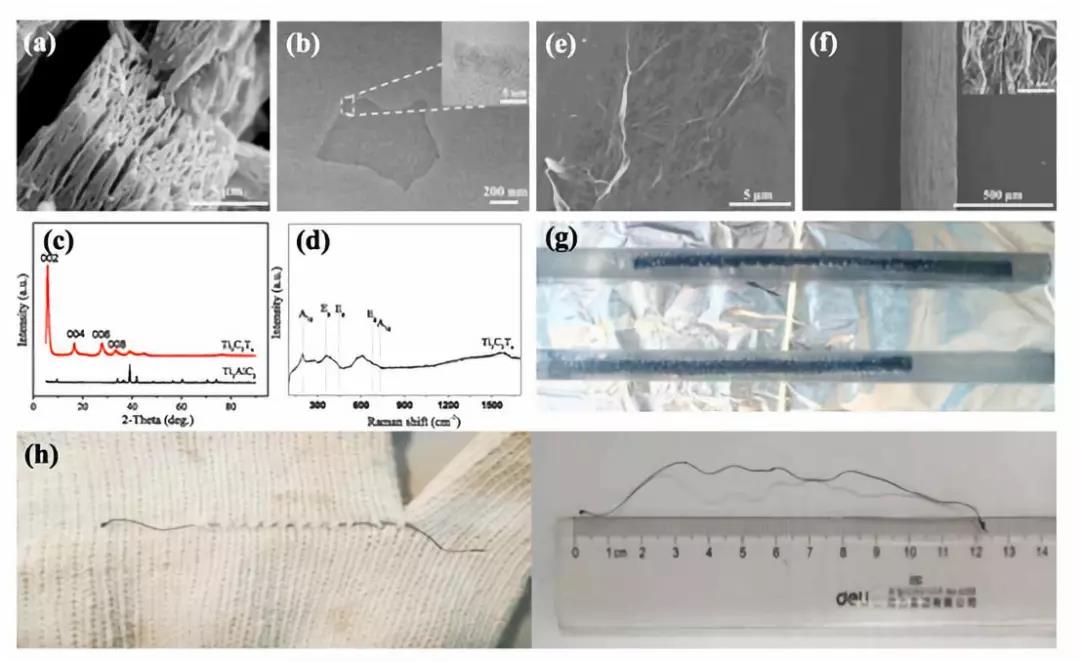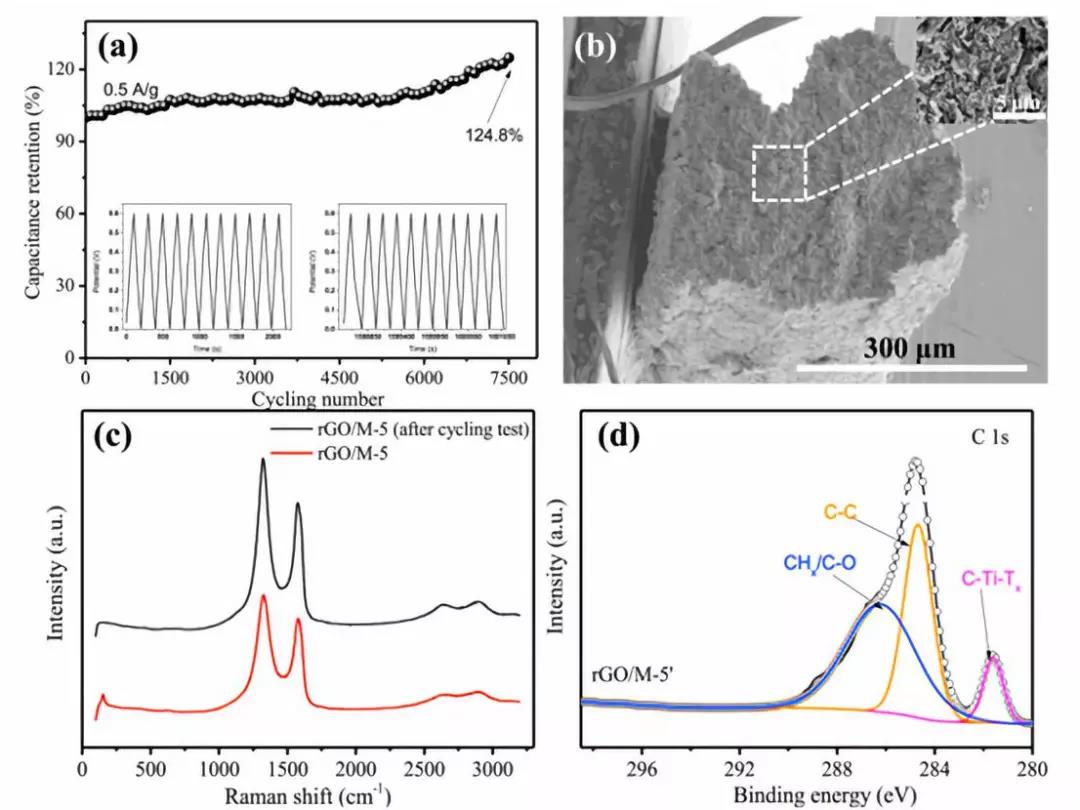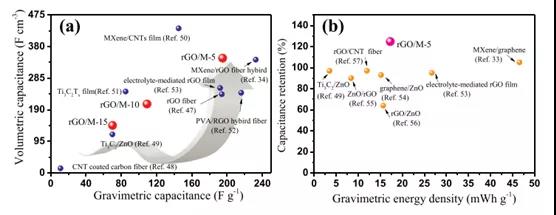rGO / MXene composite fiber electrode
QQ Academic Group: 1092348845
Detailed
【Research Background】
Recently, the advantages of flexible and wearable supercapacitors have stimulated a growing demand for compatible energy sources that can be integrated into fabrics that power electronic devices. Due to their potential compatibility with textile processing, fibrous electrode materials have received great attention as a substitute for traditional forms of bulk and hard materials. Graphene fibers or fiber-like graphene materials have been successfully used as electrodes for flexible and wearable supercapacitors. However, they usually exhibit relatively low volume capacitance, which will seriously hinder their widespread use as a power source in smart textiles. As a new member of two-dimensional materials, transition metal carbides and nitrides (MXene) are used in electrochemical energy storage and many other applications for their excellent electrochemical properties, metal conductivity, high density and surface hydrophilicity. Exhibits excellent performance. MXene nanosheets have a metal conductivity of up to 105 S cm-1 and a high capacitance of 1500F cm-3, which has great potential for improving the capacity performance of thin film and fibrous graphene electrodes.
[Achievement Profile]
Recently, Associate Professor Xin Zhao of Donghua University and Researcher Lili Zhang of Singapore Science and Technology Research Institute published a paper titled: Facile fabrication of flexible rGO / MXene hybrid fiber-like electrode with high volumetric capacitance in the internationally renowned academic journal Journal of Power Sources. Research paper. This study uses a simple one-step hydrothermal method to prepare fibrous rGO / MXene hybrid electrodes. In the hydrothermal process, graphene oxide reduction and ingenious macro-assembly of graphene oxide and MXene nanosheets were achieved at the same time, forming a powerful skeleton composed of large graphene sheets and small MXene sheets, which covered the space and micro hole. At a lower MXene loading (about 5 wt% to 15 wt%), this fibrous hybrid electrode can achieve a high conductivity of 1339 S m-1 and a large volume capacitance of 345.2 F cm-3. The mass ratio The capacitance is 195 F g-1. After 7,500 cycles, the capacity retention rate is still 125% at a current density of 0.5 A g-1, indicating that it has great potential as a flexible supercapacitor electrode. Studies have also shown that graphene nanoplatelets can act as a barrier or protective layer to prevent oxidation of MXene in hybrids.
[Picture and text guide]

Figure 1. Schematic diagram of the preparation process of rGO / MXene-based fiber hybrid materials

Figure 2. (a) SEM image of multilayer Ti3C2Tx; (b) TEM image of single-layer Ti3C2Tx; (cd) XRD pattern and Raman spectrum of Ti3C2Tx; (e) graphene oxide nanoplatelets obtained by ultrasonic treatment for 2 hours SEM image; (f) SEM image of pure rGO sample surface; (g) digital photo of rGO sample forming in PP tube; (h) digital photo of graphene oxide sample knitted with knitted gloves

Figure 3. (a) SEM image of rGO / M-5 (b) rGO / M-10 (c) rGO / M-15 surface; (d) SEM image of cross section of rGO / M-5, C, Ti, F EDS diffraction pattern

Figure 4. (a) XRD images of rGO, Ti3C2Tx nanosheets and rGO / MXene composites with different Ti3C2Tx content; (b) Raman spectra of rGO fibrous samples, Ti3C2Tx nanosheets and different rGO / MXene composites; Ti3C2Tx nanometers (C-d) C 1s XPS spectra of flakes and rGO / M-1; (e-f) Ti 2p XPS spectra

Figure 5. (a) CV curve with a scan rate of 10 mV s-1 (b) Constant current charge-discharge curve with a current density of 0.1 A g-1; (c) CV curves at different scan rates; (d) rGO / M-5 constant-current charge-discharge curves at different current densities; (e) Nyquist diagrams in the frequency range of 100 to 0.01 kHz; (f) rate performance of rGO / MXene composites; (g) H + Schematic in electrochemical reactions677777777777777777

Figure 6. (a) Cycle life of rGO / M-5; SEM image of (b) cross-section of rGO / M-5 after cycle test; (c) Raman spectrum and (d) C1s XPS spectrum

[Summary of this article]
We have designed a simple one-step self-assembly hydrothermal method for manufacturing flexible fibrous rGO / MXene supercapacitor composite electrodes. Due to the synergy between graphene and MXene nanosheets, the interlayer nanostructures can effectively combine the high electrical conductivity and pseudocapacitive properties of MXene, thereby greatly improving the electrochemical performance of the electrode. The volume capacitance of MXene fiber composite electrode with only 5 wt% loading can reach 345.2cm-3, and the mass specific capacitance is 195 F g-1 at 0.1A g-1, which is higher than other reported graphene and carbon nanotubes. Electrodes and rGO / MXene fiber electrodes with a large load of MXene. When the current density is 0.5A g-1, after 7,500 cycles, the capacitance retention rate is 124.8%, and its cycle stability is good. In addition, graphene in the composite product can inhibit the oxidation process of MXene. This work provides a general and effective strategy for the development of high-performance hybrid electrode materials for supercapacitors.
Literature link:
https://doi.org/10.1016/j.jpowsour.2019.227398
- Previous: Review: MXene-based an
- Next: MXene breakthrough: Na


 mxene academic
mxene academic
